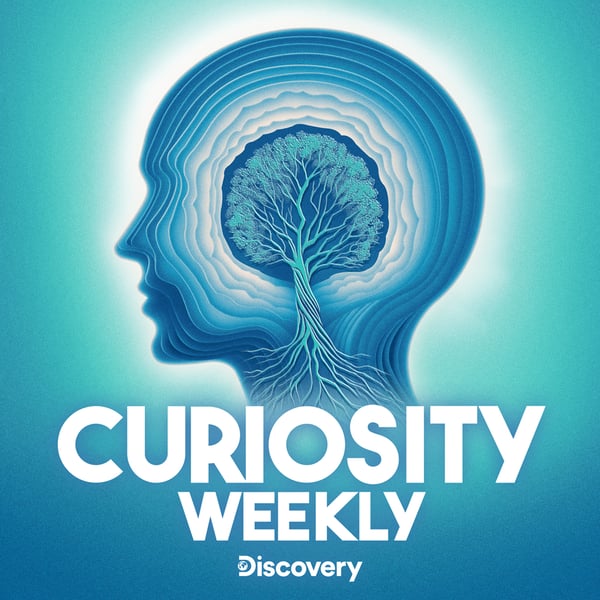New Antibiotic Discovered by AI, How to Handle Traumatic Memories, and Why Extreme Temperatures Mess with Your Batteries
Curiosity Weekly
Warner Bros. Discovery
4.6 • 935 Ratings
🗓️ 16 March 2020
⏱️ 10 minutes
🧾️ Download transcript
Summary
Learn about how to use focused attention to ease the memory of a traumatic event; why extreme temperatures mess with your batteries, and what you can do about it; and how researchers used machine learning to discover a powerful antibiotic for the first time.
Researchers ease the memory of traumatic events by having patients focus on neutral details by Kelsey Donk
- Focus on context diminishes memory of negative events, researchers report. (2020). EurekAlert! https://www.eurekalert.org/pub_releases/2020-02/uoia-foc020520.php
- Dolcos, F., Katsumi, Y., Bogdan, P. C., Shen, C., Jun, S., Buetti, S., Lleras, A., Bost, K. F., Weymar, M., & Dolcos, S. (2020). The impact of focused attention on subsequent emotional recollection: A functional MRI investigation. Neuropsychologia, 138, 107338. https://doi.org/10.1016/j.neuropsychologia.2020.107338
- Iordan, A. D., Dolcos, S., & Dolcos, F. (2018). Brain Activity and Network Interactions in the Impact of Internal Emotional Distraction. Cerebral Cortex, 29(6), 2607–2623. https://doi.org/10.1093/cercor/bhy129
Why Extreme Temperatures Mess With Your Batteries by Ashley Hamer: https://curiosity.com/topics/heres-why-extreme-temperatures-drain-your-batteries-curiosity
A powerful antibiotic was discovered using machine learning for the first time by Grant Currin
- E&T editorial staff. (2020, February 21). New antibiotic discovered using machine learning algorithm. Theiet.Org. https://eandt.theiet.org/content/articles/2020/02/new-antibiotic-discovered-using-machine-learning-algorithm/
- Sample, I. (2020, February 20). Powerful antibiotic discovered using machine learning for first time. The Guardian; The Guardian. https://www.theguardian.com/society/2020/feb/20/antibiotic-that-kills-drug-resistant-bacteria-discovered-through-ai
- Stokes, J. M., Yang, K., Swanson, K., Jin, W., Cubillos-Ruiz, A., Donghia, N. M., MacNair, C. R., French, S., Carfrae, L. A., Bloom-Ackerman, Z., Tran, V. M., Chiappino-Pepe, A., Badran, A. H., Andrews, I. W., Chory, E. J., Church, G. M., Brown, E. D., Jaakkola, T. S., Barzilay, R., & Collins, J. J. (2020). A Deep Learning Approach to Antibiotic Discovery. Cell, 180(4), 688-702.e13. https://doi.org/10.1016/j.cell.2020.01.021
Subscribe to Curiosity Daily to learn something new every day with Cody Gough and Ashley Hamer. You can also listen to our podcast as part of your Alexa Flash Briefing; Amazon smart speakers users, click/tap “enable” here: https://curiosity.im/podcast-flash-briefing
Find episode transcript here: https://curiosity-daily-4e53644e.simplecast.com/episodes/new-antibiotic-discovered-by-ai-how-to-handle-traumatic-memories-and-why-extreme-temperatures-mess-with-your-batteries
Hosted on Acast. See acast.com/privacy for more information.
Transcript
Click on a timestamp to play from that location
| 0:00.0 | Hi, you're about to get smarter in just a few minutes with Curiosity Daily from |
| 0:04.9 | Curiosity.com. I'm Cody Gough. And I'm Ashley Hamer. Today you learn about a |
| 0:09.2 | trick for easing the memory of a traumatic event, why extreme temperatures mess with your batteries and what you can do about it, |
| 0:16.0 | and how researchers use machine learning to discover a powerful antibiotic for the first time. |
| 0:21.0 | Let's start us out some curiosity. |
| 0:24.0 | Researchers have identified a pretty effective way to ease the memory of traumatic events. |
| 0:29.0 | And I mean, you know the bad things happen sometimes. |
| 0:32.0 | That's just a fact. Once in a while the memory of a bad thing can do even more damage than the thing itself. |
| 0:39.0 | But recent research suggests that a strategy called focused attention could help people recover from memories like this. |
| 0:47.0 | Basically, if you focus your attention, focused attention, get it, on neutral aspects of the scene, you might remember less about the most painful parts. |
| 0:58.0 | Strong emotions can make memories more vivid. That's great when you want to remember your wedding day, but not so great when you want to forget a car crash. |
| 1:06.0 | For some people, traumatic memories like those can play and replay and their minds for years. |
| 1:12.0 | That kind of obsessive recollection can... replay in their minds for years. |
| 1:13.0 | That kind of obsessive recollection can lead to PTSD or depression. |
| 1:17.0 | That's especially risky for people whose jobs require them to encounter some emotionally |
| 1:22.2 | challenging stuff, like first responders, therapists, and teachers. |
| 1:27.0 | But regardless of your occupation, this strategy could really take the emotional sting out of painful or traumatic memories. |
| 1:35.0 | There are two ways this focused attention strategy can help, when you experience an event in |
| 1:40.0 | the first place and when you recall it afterward. A recent study on the first |
| 1:44.5 | approach had people take a look at some pictures of things that were either |
| 1:47.8 | neutral like trees or negative like bloody faces and focus either on what was in the foreground or what was in the background. |
| 1:56.0 | Later when the participants were asked to recall what they had seen, |
... |
Please login to see the full transcript.
Disclaimer: The podcast and artwork embedded on this page are from Warner Bros. Discovery, and are the property of its owner and not affiliated with or endorsed by Tapesearch.
Generated transcripts are the property of Warner Bros. Discovery and are distributed freely under the Fair Use doctrine. Transcripts generated by Tapesearch are not guaranteed to be accurate.
Copyright © Tapesearch 2025.

